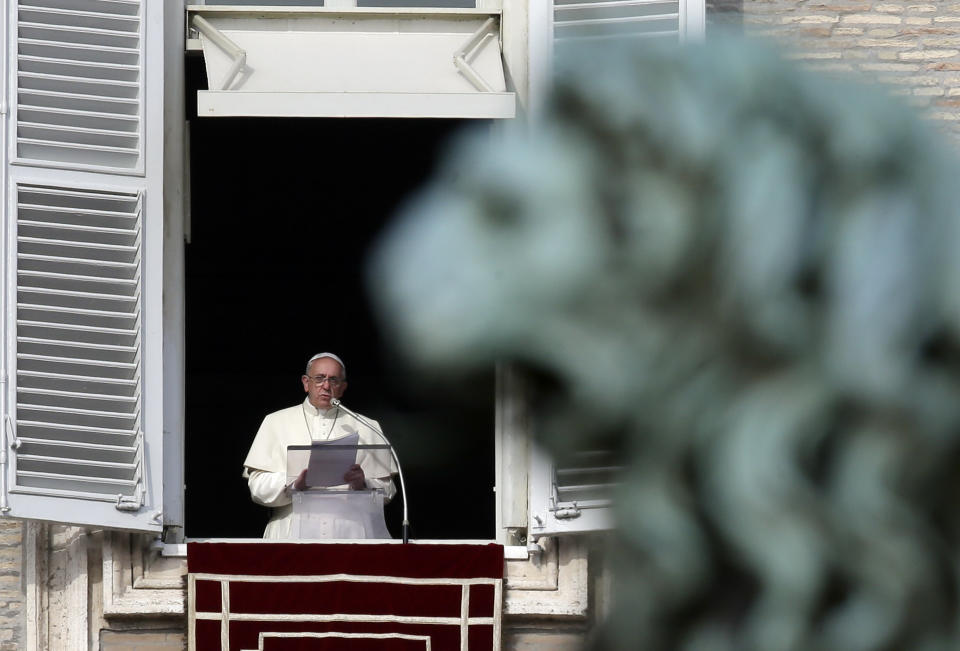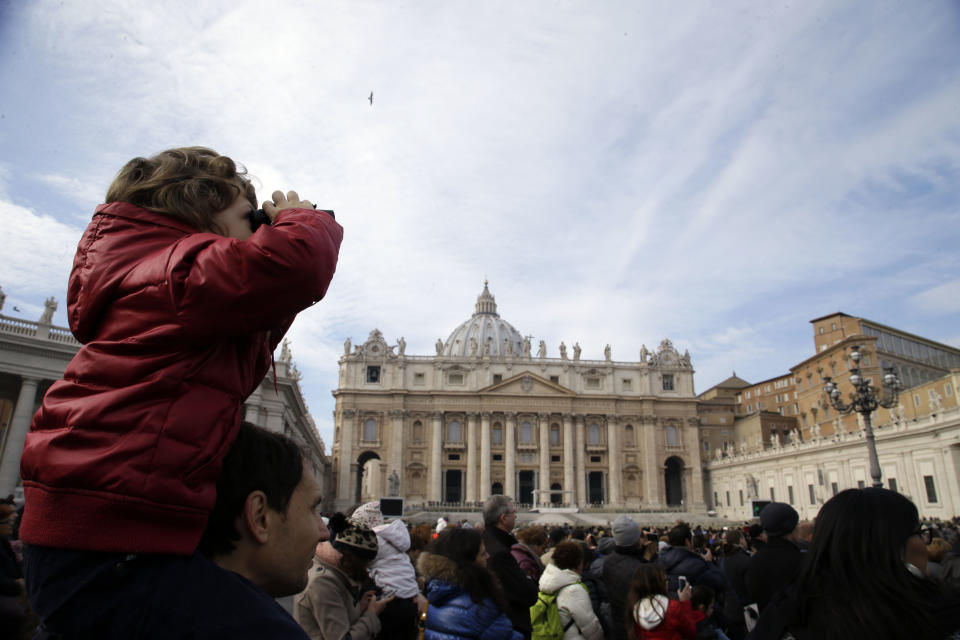Pope names 19 new cardinals, focusing on the poor
VATICAN CITY (AP) — Pope Francis named his first batch of cardinals Sunday, choosing 19 men from around the world, including the developing nations of Haiti and Burkina Faso, in line with his belief the church must pay more attention to the poor.
But advocates for victims of sex abuse by Catholic clergy said they felt let down that Francis didn't unequivocally embrace their calls that prelates who hadn't made a clean break with past practices of covering up pedophile behavior never be promoted.
Francis read out the 19 names to a crowd of tens of thousands in St. Peter's Square.
Sixteen of the appointees are younger than 80, meaning they would be eligible to elect the next pope, which is a cardinal's most important task, after the Feb. 22 ceremony to formally install them.
Since his election in March as the first pontiff from Latin America, the pope has broken tradition after tradition in terms of protocol and style at the Vatican. But in Sunday's list, Francis stuck to the church's rule of having no more than 120 cardinals eligible to elect the next pontiff.
The College of Cardinals is 13 shy of that 120-mark among eligible-to-vote members. In addition, three cardinals will turn 80 by May. That means Francis chose the exact number of new cardinals needed to bring the voting ranks up to 120 during the next few months.
Some appointments were expected, including that of his new secretary of state, Italian archbishop Pietro Parolin, and the German head of the Vatican's watchdog office for doctrinal orthodoxy, Gerhard Ludwig Mueller. Two others named Sunday also come from the curia, as the Holy See's Rome-based bureaucracy is known.
The Vatican spokesman, the Rev. Federico Lombardi, said the pope's selection of churchmen from Haiti and Burkina Faso reflects Francis' attention to the destitute as a core part of the church's mission.
Francis' announcement of the honor of the Les Cayes Bishop Chibly Langlois, who, at 55, was the youngest of the appointees, came as the impoverished Caribbean nation marked the anniversary of the quake there that killed tens of thousands of people.
"Today we are marking four years since the earthquake," said a priest, Hans Alexandre, in Haiti. The pontiff's emphasis on the poor "touches us immensely."
In Burkina Faso, the archbishop of Ouagadougou, Philipe Ouedraogo, said he thought reporters had made a mistake when they called him about his promotion to cardinal's rank, as he had no advance word from the Vatican. He also embraced Francis' vision of a church toiling for those on the margins of society.
"I fully recognize myself in his vision and pastoral philosophy that, like Jesus, identifies himself with the poor and the sick," the African prelate said. Ouedraogo, very popular in his homeland, had recently opposed a proposed change to the constitution to allow the country's president, in power since 1987, to run for another term.
Once again, the cardinal's red hat eluded Dublin Archbishop Diarmuid Martin. The prelate in that traditionally Catholic country has angered some in the Vatican by strongly criticizing how the hierarchy handled the worldwide clerical sex abuse scandal.
The U.S.-based Survivors Network of those Abused by Priests, or SNAP, expressed disappointment that Francis didn't promote Martin.
SNAP criticized the choice of Mueller, saying he had a "dreadful" record on children's safety.
Under the tenure of Mueller, who was appointed by Pope Benedict XVI, a fellow German, critics have accused the Vatican's handling of the sex abuse scandal, including letting pedophile priests transfer from parish to parish when complaints were made.
Groups such as SNAP also have criticized the Vatican's recent refusal under Francis to allow the extradition of a Polish archbishop being investigated in his homeland for alleged sex abuse. But SNAP welcomed the fact that three high-ranking archbishops in the U.S, where the sex scandal has enraged faithful for decades now, weren't promoted to cardinal.
In Chile, those who had denounced for sex abuse a priest who had long been one of the country's most popular clerics, lamented that one of Chile's church hierarchy was being promoted.
Dr. James Hamilton, the first to publicly denounce the priest, said he hoped the soon-to-be cardinal, Santiago Archbishop Ricardo Ezzati Andrello, would "drown in power, boastfulness, vanity, corruption, perversion and greed," adding sarcastically, "that is a good cardinal."
Ezzati, commenting on his selection, insisted the Chilean church is "learning from its mistakes."
Buenos Aires Archbishop Mario Aurelio Poli was chosen to become a "prince of the church," as cardinals are known. It was a post that Francis left when he was elected as the first Latin American pope in March. Poli had impressed Francis by earning a degree in social work from the public university of Buenos Aires.
The selection of Orani Joao Tempesta, the archbishop of Rio de Janeiro, as a new cardinal was widely hoped for back home to thank him for organizing Francis' wildly popular visit to that city in July.
Whether one continent or country has a large contingent of cardinals is watched when it comes time to pick the next pope because churchmen could vote as a geographic bloc.
Not counting the four picks from the curia who no longer represent the church in their homelands, the other new voting cardinals include two from Europe, three from North and Central America, three from South America, and two apiece from Africa and Asia.
Francis has stressed that the church hierarchy mustn't view itself as an elite aloof from its flock, but instead serve its flock, especially the poor.
___
Marco Sibaja from Brazil, Marianela Jarroud from Chile, Brahima Ouedraogo from Burkina Faso and Trenton Daniel from Haiti contributed to this report.




